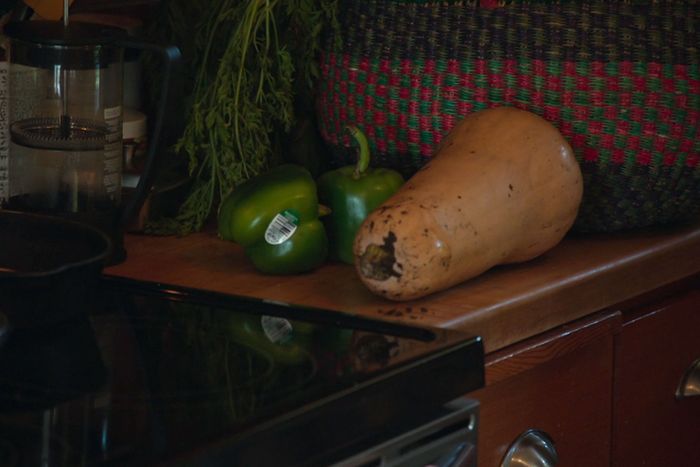
Nathan Fielder’s The Rehearsal is a series about a man obsessed with tiny details, so it’s very much in keeping with the show’s entire method of operation to pick one very small thing and claim that it is the key to everything. Maybe your version of that, for The Rehearsal, is a police officer standing on a street and cursing the day the Chinese invented gunpowder. Maybe it’s a Scion TC going 100 miles an hour. But for me, that object is a small grocery-store produce label stuck onto a green bell pepper. In it, I see the entire Nathan Fielder project. I see the entire entertainment industry. In that little grocery-store sticker, I see the world.
In case you need reminding about this particular green pepper, it shows up in The Rehearsal’s third episode, “Gold Digger.” After building a rehearsal for Angela, a woman who wants to explore becoming a mother, Fielder enters the rehearsal himself and starts pretending to be the father. Set to footage of the two “parents” playing with their “son,” Fielder’s voice-over describes how beguiling it is to forget that the whole thing is fake. “Every now and then, there are these glimmers, these moments where you forget and you just feel like a family,” he says. “That’s when you know a rehearsal is working.”
Then the episode cuts to a scene where Fielder watches Angela at the kitchen sink, washing vegetables. They’re part of her parenthood dream — she wants to be living off the grid, growing her own food — so Fielder’s production staff has obliged, planting seeds in the ground, then surreptitiously swapping them for full-grown produce to fit with the rehearsal’s accelerated timeline. Angela stands at the sink washing carrots, then Nathan’s eye catches on a green pepper on the counter nearby. There’s a grocery-store sticker on it. The whole scene is a lie.
The artifice of The Rehearsal is fascinating in part because the seams are always showing, at least a little bit. There are cameras everywhere. Angela’s pretending to be a mother, but her “son” is played by a completely different person every few hours. Sometimes the falseness is deliberate, exaggerated to be as funny as possible. The vegetables Angela “harvests” from her garden are just ripe zucchinis buried halfway into the ground, looking more like a simulated video-game crop than like anything from real life.
Part of the green pepper’s beauty is the way it develops out of those goofy vegetables half-buried in the dirt, which are the most forthrightly absurd thing about this episode of The Rehearsal. Fielder loves that move, from the ridiculous to the existential. It is the basis for the premiere episode’s transition from silly trivia into imagined betrayal, and it’s what episode two reaches for, beginning with Angela’s disastrously ill-chosen father figure and ending with Fielder’s decision to step up. But the pepper is the clearest and most impressive instance of this swing: from vegetables in a field so fake that they’re laughable, to Fielder staring at a produce sticker and questioning how a mind translates perceived experience into palpable emotion.
This image from The Rehearsal has stayed with me. It’s so simple and small, amid the show’s otherwise maximalist approach to catching its audience off guard. It is so clear and unnerving, and whether it was scripted or not, Fielder plays the moment with convincing frustration and perplexity. The Rehearsal is a hard show to explain, but for me, that pepper is the clearest way to get at what Fielder is toying with. It’s a fantasy of creating a perfect alternate reality, except basically none of it is perfect and all of it relies on the willful self-delusion of its participants. What lies are we willing to accept? What evidence is it possible to ignore? Given the chance, in the middle of a delusion we want to maintain, wouldn’t most of us choose to turn that pepper toward the wall?
“Emotions are a funny thing,” Fielder says, narrating his own pepper-based existential crisis. “After all, there’s only so much you can do to deceive yourself.” He stands up and walks over to the offending vegetable, but instead of removing the sticker, he rotates it, obscuring it from view. It still exists. The glaring signal that all of this is make-believe is still right there, sitting on the kitchen counter. Fielder can’t bring himself to just remove the problem; it’s too appealing and powerful to stand there, toggling back and forth between the world that is and the world he created. And even if he did take the sticker off, then what? You’ve still got your own inability to just go along with things, your failure to see the world you want to see. But now it’s stuck to your finger.


